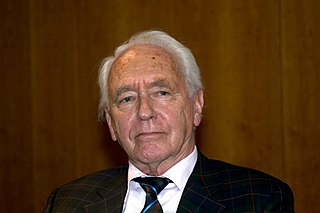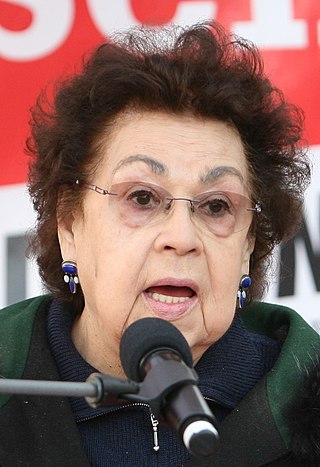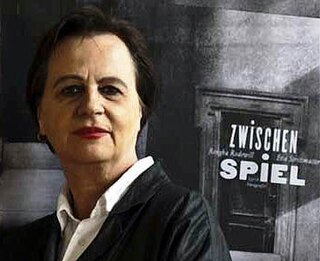Related Research Articles
Junge Welt is a German daily newspaper, published in Berlin. The jW describes itself as a left-wing and Marxist newspaper. German authorities categorize it as a far-left medium hostile to the constitutional order.

Berliner Fussball Club Dynamo e. V., commonly abbreviated to BFC Dynamo or BFC, alternatively sometimes called Dynamo Berlin, is a German football club based in the locality of Alt-Hohenschönhausen of the borough of Lichtenberg of Berlin. BFC Dynamo was founded in 1966 from the football department of SC Dynamo Berlin and became one of the most successful clubs in East German football. The club is the record champion of East Germany with ten consecutive league championships from 1979 through 1988. BFC Dynamo competes in the fourth tier Regionalliga Nordost. The club enjoys a cross-city rivalry with 1. FC Union Berlin and a historical rivalry with SG Dynamo Dresden. The rivalry with Union Berlin is part of the Berlin derby.

Eva Strittmatter was a German writer of poetry, prose, and children's literature.

Wolf Dietrich Schneider was a German journalist, author, and language critic. After World War II, he learned journalism on the job with Die Neue Zeitung, a newspaper published by the US military government. He later worked as a correspondent in Washington for the Süddeutsche Zeitung, then as editor-in-chief and from 1969 manager of the publishing house of Stern. He moved to the Springer Press in 1971. From 1979 to 1995, he was the first director of a school for journalists in Hamburg, shaping generations of journalists. He wrote many publications about the German language, becoming an authority. He promoted a concise style, and opposed anglicisms and the German orthography reform.

Ingeborg Drewitz was a German writer and academic.

Elisabeth Mohn is a German billionaire businesswoman and philanthropist. She was married to Reinhard Mohn until his death in 2009.

Walter Kaufmann was a German-Australian writer.

Karl-Heinz Schröter is a German politician. He is the current State Minister of the Interior government of Minister-President Dietmar Woidke of Brandenburg. He previously served as district administrator of the Oberhavel district and was a member of the twelfth German Bundestag.

Elke Heidenreich is a German author, TV presenter, literary critic and journalist. She has written audio plays, a magazine column, scripts for television plays and books. Heidenreich is known as the Kabarettist who created a character, Else Stratmann. She is a literary critic in the television Literaturclub of the Schweizer Fernsehen.

Elfriede Brüning was a German communist journalist and novelist. She also used the pseudonym Elke Klent.

Heinz Knobloch was a German writer and journalist, who spent most of his professional career working in the German Democratic Republic.

Gisela Steineckert is a German writer known for her books and song lyrics. She has also written numerous radio plays and several film scripts. In terms of published output she was particularly prolific before 1989, but her professional career has nevertheless outlasted the German Democratic Republic.
Brigitte Zimmermann is a German journalist. Between 1983 and 1991 she was editor in chief of Wochenpost, East Germany's top selling weekly newspaper.
Oliver Proske is a German stage designer, industrial designer, exhibition designer, producer and managing director. In 1998 he founded the Berlin-based independent theatre company Nico and the Navigators together with his partner Nicola Hümpel.

Rengha Rodewill is a German photographer, author, painter, graphic designer and dancer.

Kerstin Griese is a German politician (SPD). She is a member of the German Bundestag and Parliamentary State Secretary to the Federal Minister of Labor and Social Affairs. She also belongs to the Council of the Evangelical Church in Germany (EKD).

Gisela Martine Getty is a German photographer, film director, designer and author. She and her late sister, Jutta Winkelmann, are known in Germany as high-profile representatives of what German historiography calls the '68-movement.

Helena Forti was a dramatic soprano active 1906 – 1924, closely associated with the Dresden royal court opera, known for her beauty, voice and strong stage presence. She sang all Wagner's opera heroines, in Dresden, Bayreuth and internationally. Other repertoire included the title role in Verdi's Aida, Santuzza in Cavalleria and contemporary works like Marietta in Korngold's Die tote Stadt. She created the role of Mytocle in Eugen d'Albert's opera Die toten Augen. Her Sieglinde in Die Walküre in Braunschweig was described by the Neue Zeitschrift für Musik as "Equally endowed with youth, beauty and vocal means... (Forti) immerses herself so intensely in her role that one believes the transformation of the virgin-Goddess into a human form." After retiring from singing she taught voice and acting in Gera, Düsseldorf and Vienna. She died in Vienna, where she lived with her stage director and Intendant husband, Walter Bruno Iltz.

Friedrich Luft was a German feuilletonist and theater critic.

Dietrich Karl Nummert was a German journalist and author.
References
- ↑ Kurt Starke. "Im Gedenken an Jutta Resch-Treuwerth - meiner Mutter - bleibt diese Website mit ihrem Kolumnen und Büchern erhalten" . Retrieved 16 December 2017.
- ↑ Kurt Starke (1 March 2015). "Nachruf: Jutta Resch-Treuwerth". Jutta Resch-Treuwerth * 30. 04. 1941 + 18. 02. 2015. Gesellschaft für Sexualwissenschaft e.V. (GSW), Leipzig. Retrieved 16 December 2017.
- 1 2 3 4 5 6 Michael Meyen; Anke Fiedler (2013). Gehört nicht in die Zeitung - und schon lange nicht in dieser Form. Wer jung ist, liest die Junge Welt: die Geschichte der auflagenstärksten DDR-Zeitung. Ch. Links Verlag. pp. 137–138. ISBN 978-3-86153-749-6.
- 1 2 3 Jutta Resch-Treuwerth. "Ich über mich". Im Gedenken an Jutta Resch-Treuwerth - meiner Mutter - bleibt diese Website mit ihrem Kolumnen und Büchern erhalten. Unter vier Augen. Retrieved 16 December 2017.
- 1 2 Frau Doktor Sommer der DDR; in: Berliner Zeitung, 19 February 2015, p. 25.
- ↑ "Jutta Resch-Treuwerth berät wieder "Unter vier Augen" Angst, daß es bei der Liebe nur ums Geld geht". Berliner Zeitung. 5 February 1996. Retrieved 18 December 2017.
- ↑ Andreas Montag (30 September 2010). "Sexualität So liebt es der Osten". Mediengruppe Mitteldeutsche Zeitung GmbH & Co. KG (Mitteldeutsche Zeitung), Halle. Retrieved 18 December 2017.
- ↑ "Jutta Resch-Treuwerth gestorben". Junge Welt, Berlin. 19 February 2015. Retrieved 18 December 2017.
- ↑ Berliner Zeitung, 6 October 1981, p. 5.